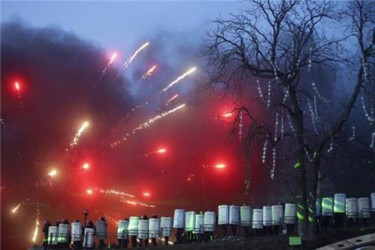KIEV, (Reuters) – Ukrainian riot police charged protesters occupying a central Kiev square last night after the bloodiest day since the former Soviet republic, caught in a geo-political struggle between Russia and the West, won its independence.

Police battled their way into Independence Square, centre of three months of protests against President Viktor Yanukovich, but demonstrators, some armed with clubs and wearing helmets and body armour, tried to stand their ground.
Smoke billowed from burning tents and piles of tyres and wood as thousands of protesters held on to the centre of the square, a Reuters cameraman said. Several floors of a trade union building, used as an anti-government headquarters, were on fire.
At least 14 protesters and seven policemen were killed during violence that erupted in Kiev yesterday and continued into the early hours of today. Many were killed by gunshot and hundreds more injured, with dozens of them in serious condition, police and opposition representatives said.
Alarmed Western governments demanded restraint and dialogue. U.S. Vice President Joe Biden called Yanukovich, urging him to pull back the government forces and exercise maximum restraint, the White House said.
Opposition leader Vitaly Klitschko said that he had quit talks with President Viktor Yanukovich without reaching any agreement on how to end the violence.
“The government must immediately withdraw troops and put an end to the bloody conflict, because people are dying. I told Yanukovich this,” Klitschko said after the late night talks. “How can we hold talks while blood is being shed?”
The unrest has spread to at least three cities in the western part of the country. Police said protesters had seized regional administration headquarters in the cities of Ivano-Frankivsk and Lviv. Local media said protesters torched the main police station in the city of Ternopil.
Earlier, the state security service set a deadline for the demonstrators to end disorder or face “tough measures”. Then the police advanced to the square before launching a full assault in the early hours, throwing stun grenades and using water cannons.
Nationwide demonstrations erupted in November after Yanukovich bowed to Russian pressure and pulled out of a planned far-reaching trade agreement with the European Union, deciding instead to accept a Kremlin bailout for the heavily indebted economy.
Western powers warned Yanukovich against trying to smash the pro-European demonstrations, urging him to turn back to the EU and the prospect of an IMF-supported economic recovery, while Russia accused them of meddling.
Ukraine has been rocked periodically by political turmoil since gaining independence from the Soviet Union more than 22 years ago, but it had never experienced violence on this scale.
As the security forces moved forward, Klitschko, a former world champion boxer, reacted defiantly, telling supporters on the square: “We will not leave here. This is an island of freedom. We will defend it.”
Earlier yesterday the State Security Service (SBU), in a joint statement with the Interior Ministry, signalled the government’s intentions. “If by 6 p.m. the disturbances have not ended, we will be obliged to restore order by all means envisaged by law,” they said.
The riot police moved in hours after Moscow gave Ukraine $2 billion in aid for its crippled economy that it had been holding back to demand decisive action to crush the protests.
PRAYING FOR UKRAINE
EU Enlargement Commissioner Stefan Fuele said he had spoken to Ukraine’s acting prime minister, who had given assurances that the authorities would try to avoid using live firearms.
“For the sake of the Ukrainians and for the sake of the future of that country, I will pray that he is right,” Fuele told a public event in Brussels.
A police spokeswoman gave a variety of reasons for the deaths including gunshot wounds, a traffic accident and heart attacks. One protester died in a fire.
Right Sector, a militant far-right group, added to tensions by calling on people holding weapons to go to Independence Square, also known as Maidan, to protect it from the security forces.
As protesters and police battled on the streets of Kiev, Russia called the escalation a “direct result of connivance by Western politicians and European structures that have shut their eyes … to the aggressive actions of radical forces”.
U.N. Secretary-General Ban Ki-moon appealed for restraint, his spokesman Martin Nesirky said. “He is extremely concerned over today’s reports of renewed violence and fatalities,” said Nesirky.





